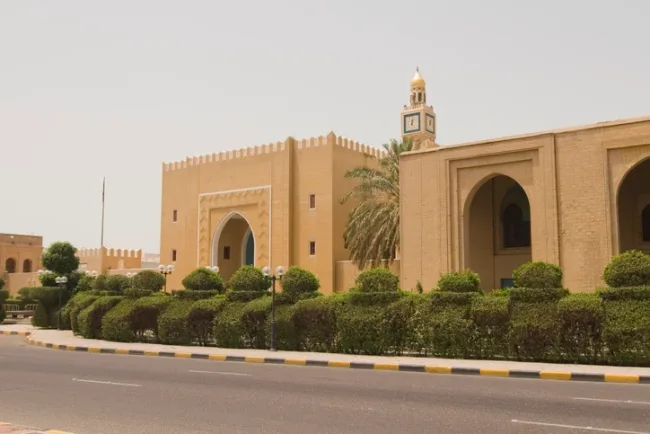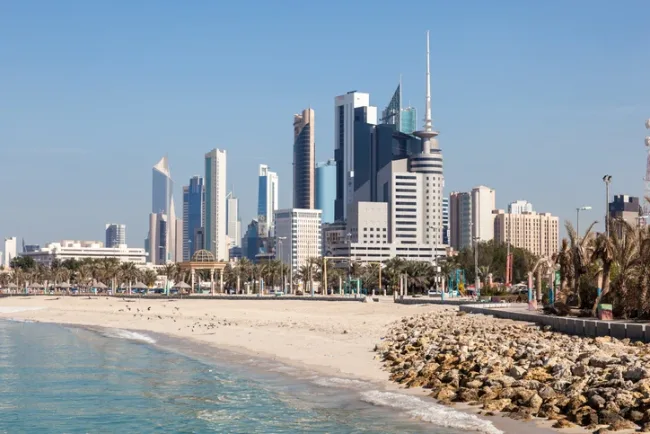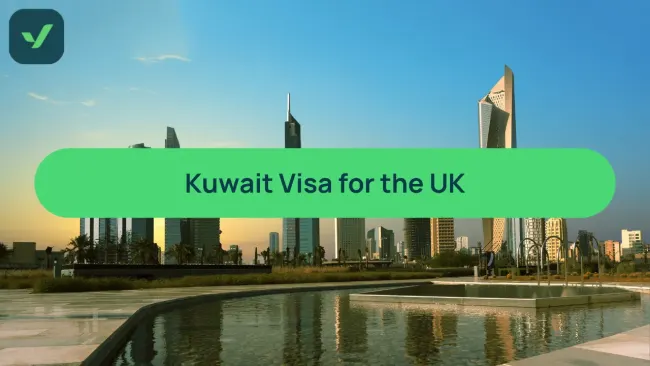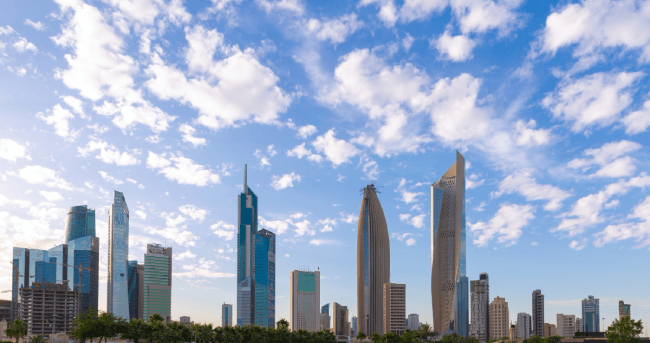
Kuwait
Welcome to Kuwait
Planning a trip to Kuwait? You're in the right spot! This blog is all set to guide you through whether you need a visa and pick the right one based on why you're visiting.

What's a Kuwait eVisa, and who's it for?
Who's the Kuwait eVisa for?
-
More than 50 countries can apply for the Kuwait eVisa, including Japan, Norway, Australia, Canada, Vatican City, and more. Nationals from these countries can also apply for a visa on arrival instead of an eVisa.
-
Foreign residents living in Gulf Cooperation Council (GCC) countries with a valid residence permit.
Find out if you qualify for the Kuwait eVisa with the Visa Checker Tool.
Who's not eligible for a Kuwait eVisa?
-
Travelers not qualifying for the eVisa have to apply in person at a Kuwaiti embassy or consulate.
-
Citizens of GCC countries (Saudi Arabia, Bahrain, Qatar, the United Arab Emirates, and Oman) are visa-exempt.
What's the purpose of the Kuwait eVisa?
-
For tourism-related activities like exploring Kuwait's rich culture and history.
-
For short-term business-related activities like attending meetings and conferences.
How long can you stay with a Kuwait eVisa?
The eVisa grants a single entry to the country and allows its holder a temporary stay for a maximum of 3 months starting from the entry date.
What's a Kuwait Business Visa, and who's it for?
Who's the Kuwait Business Visa for?
Foreigners who intend to stay temporarily and engage in legitimate business activities but don't take up employment in Kuwait.
What's the purpose of a Kuwait Business Visa?
This visa allows you to:
-
Participate in business meetings and discussions.
-
Attend trade shows, conferences, and seminars.
-
Explore business opportunities and conduct market research.
How long can you stay with a Kuwait Business Visa?
A Kuwait Business Visa grants a stay of up to 90 days, which can vary based on the specific terms of your visa or as dictated by Kuwaiti immigration authorities.
What's a Kuwait Transit Visa, and who's it for?
Who's the Kuwait Transit Visa for?
Travelers who require a visa to enter Kuwait and need to pass through en route to another country.
What's the purpose of a Kuwait Transit Visa?
To legally allow travelers to pass through Kuwait when heading to a third country. It's perfect for those who:
-
Have long layovers (more than 24 hours) and wish to leave the airport to explore or rest.
-
Need to switch airports in Kuwait for their onward journey.
How long can you stay with a Kuwait Transit Visa?
This visa allows you to stay in the country for up to 7 days.
What are the Kuwaiti long-term visa options, and who are they for?

Kuwait offers a variety of long-term visa options catering to different needs. Whether you're looking to work, join your family, study, or invest, Kuwait has provisions in place. Here's a rundown of the common long-term visa types and their purposes.
-
Work visa: For professionals and workers looking to be employed in Kuwait. It requires a job offer from a Kuwaiti company and sponsorship to apply.
-
Student visa: Aimed at international students accepted into Kuwaiti educational institutions. Applicants must provide proof of acceptance from the institution and evidence of sufficient financial support for their stay.
-
Dependant visa: Designed for family members of those working or studying in Kuwait. This includes spouses, children, and sometimes other dependents. The primary visa holder must prove their ability to support accompanying family members financially.
-
Residence visa: For individuals who intend to reside in Kuwait for extended periods. It can be granted to those who invest in the country, own properties, or wish to retire in Kuwait.
We currently can help you apply for a Kuwait eVisa, but for now, we don't handle applications for other travel visas and long-term visas. For the most accurate and detailed information on applying for these visas, you can visit the Kuwait Ministry of Interior website.
Staying healthy in Kuwait: Here's what you need to know
With its blend of modernity and tradition, Kuwait offers visitors a rich cultural experience and access to high-quality healthcare services. Here's a breakdown of what you need to know to stay healthy in Kuwait.
Make sure to stay updated on routine vaccines
Before traveling to Kuwait, ensure you're up-to-date with routine vaccinations such as measles-mumps-rubella (MMR), diphtheria-tetanus-pertussis, varicella (chickenpox), polio, and your yearly flu shot.
The following vaccines are recommended for international visitors:
-
Hepatitis A: This vaccine is recommended due to possible exposure through contaminated food or water in Kuwait, regardless of where you eat or stay.
-
Hepatitis B: Consider this vaccine if you anticipate activities involving exposure to bodily fluids, such as medical procedures, piercings, or tattoos.
-
Measles: Recommended for infants 6 to 11 months old, as outbreaks have occurred in many regions worldwide. Kuwait has seen cases of measles, and being vaccinated can provide protection.
-
Rabies: Although rabies isn't a significant risk for most travelers to Kuwait, the vaccine is recommended for those who might be involved in outdoor activities that could bring them into direct contact with bats, dogs, and other mammals.
-
Typhoid: In Kuwait, you can get typhoid through contaminated food or water. This vaccine is particularly recommended for adventurous eaters and travelers visiting smaller cities or rural areas.
-
Stay informed about Kuwait's COVID-19 guidelines, including any requirements for quarantine, testing, or vaccination proof, by consulting your airline or the Ministry of Health website.
Medical facilities
Kuwait boasts a comprehensive healthcare system, including public and private medical facilities.
-
Public hospitals and clinics provide high-standard medical care, often at a lower cost or free for citizens. Expatriates and visitors can access these services but will be subject to higher costs.
-
Private hospitals and clinics offer high-quality care with potentially shorter waiting times. Many expatriates and tourists prefer private facilities for convenience and English-speaking staff availability.
-
Widely available across Kuwait, pharmacies offer a range of over-the-counter and prescription medications. It's advisable to carry a prescription for any medications you bring into the country.
Health insurance
It's highly advised to have health insurance while you're traveling.
Medical care, particularly in private clinics, can be quite pricey. Make sure your insurance covers significant expenses, such as emergency evacuation if needed.
Check with your insurance provider to confirm that your policy provides broad coverage, especially for:
-
Refunds for any travel setbacks like cancellations, delays, or interruptions.
-
Costs related to receiving medical care and the need for evacuation.
-
Payouts for any luggage that gets lost.
Things to be aware of when visiting Kuwait

While Kuwait is generally safe for travelers, there are a few health-related considerations to keep in mind.
-
Climate: Kuwait experiences extreme heat, especially from May through September, with temperatures often exceeding 40 °C (104 °F). It's crucial to stay hydrated, use sun protection, and wear light, breathable clothing. Try to schedule outdoor activities during the cooler parts of the day.
-
Cultural sensitivity: Kuwait is a Muslim country, and it's important to respect local customs and laws. Dress conservatively, especially when visiting public places like malls and restaurants. During the holy month of Ramadan, be mindful of restrictions on eating and drinking in public during daylight hours.
-
Water and food safety: While Kuwait's tap water is generally safe to drink, those with sensitive stomachs may prefer bottled water to avoid any potential issues. Exercise caution when eating street food and opt for well-cooked meals to prevent foodborne illnesses.
-
Local laws and etiquette: Familiarize yourself with local laws to avoid unintentional offenses. For example, alcohol is prohibited in Kuwait, and there are strict penalties for drug offenses. Public displays of affection are frowned upon, and photography of certain buildings, especially government and military facilities, is prohibited.
-
Environmental risks: Sand and dust storms are relatively common and can significantly reduce air quality. Those with respiratory conditions should take necessary precautions, such as staying indoors during severe storms and using air purifiers.
Medication for personal use
If you plan to take your medication to Kuwait, keep these pointers in mind.
-
Declare all medications: Inform customs about any medication you carry, especially prescription or controlled drugs.
-
Keep everything in its original packaging: Your medication should remain in its original container, complete with a label showing it's been prescribed to you.
-
Have a prescription or doctor's note: A letter from your doctor or a recent prescription should accompany you, detailing your need for the medication.
-
Check for restrictions: Make sure none of your medications are prohibited or tightly controlled in Kuwait. It's a good idea to contact the nearest Kuwaiti embassy or consulate for up-to-date information.
-
Pack only what you need: Bringing just enough medication for your stay can help avoid hassles.

 Australia ETA Online
Australia ETA Online
 United Kingdom ETA
United Kingdom ETA
 India Tourist eVisa
India Tourist eVisa
 Canada ETA Visa
Canada ETA Visa
 Turkey eVisa
Turkey eVisa
 Egypt eVisa
Egypt eVisa
 Singapore SG Arrival Card
Singapore SG Arrival Card
 Indonesia eVoa Visa
Indonesia eVoa Visa
 Aruba ED Card
Aruba ED Card


